Ripe Figs Productions is proud to present its short film Dr. Chevalier’s Lie here on the Kate Chopin International Society website. Based on Kate Chopin’s short story, “Dr. Chevalier’s Lie,” this short film (2017, 9 minutes) is available online here for the first time.
This short film was inspired by “Dr. Chevalier’s Lie,” an 1891 story that was eventually published in Vogue, on October 5, 1893. Barely a page long, Chopin’s story offers a subtle social critique, focusing on a doctor who responds to yet another violent death in an “unsavory quarter” of town. When he arrives at what can only be a brothel, he recognizes the suicide as the young woman from a homestead he once visited in Arkansas. His lie is the letter he writes to her family, concealing her “shame.” But the final lines of the story also suggest the hypocrisy of society, which briefly considers “cutting” him for his care for a “woman of doubtful repute”—but then “did not.”
Loosely based on Kate Chopin’s 1892 sketch, this short film observes the conflict of a coroner who must document the death of a young bipolar woman, whom his office was charged to protect. With the SayHerName campaign as additional inspiration, the film was featured in the Vero Beach Wine and Film Festival and others.
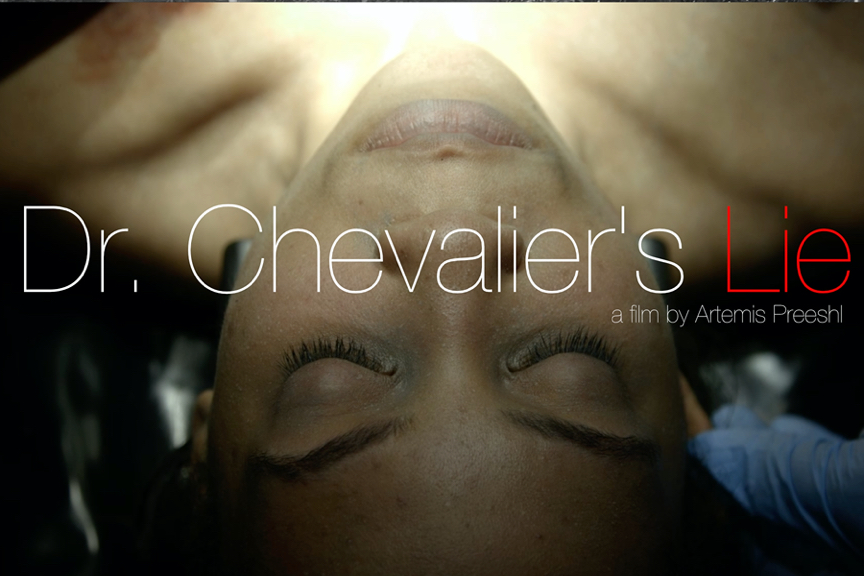
One of the chief attractions of this story for us was in fact its brevity. It was one of Ripe Figs Productions first projects, and cost was a major concern: we could only finance short, low-budget features. Film-making is notoriously expensive, and many aspiring film-makers, especially those employed in “the business,” depend on bartering and exchanging their skills within the film community. That informal system and the producers’ personal financing made both these short films possible. But “Dr. Chevalier’s Lie” also had a good plot and a serious social critique.
While we were mulling our choices, current events provided another perspective. In July 2016, Alton Sterling was murdered in Baton Rouge by two white policemen, reinforcing on a very local level the awareness that Black Lives Matter. But even more compelling to us was the Say Her Name Campaign, with its focus on women and girls of color, underlining the ways that Black Lives Matter and the media often ignore victims who are not cis-male—not to mention the high rates at which those with disabilities are subject to violence. Screenwriter Rachel Grissom was thus motivated to re-shape Dr. Chevalier’s story into one with more contemporary resonance. The result is less an adaptation of Chopin’s tale than a new story inspired by her social critique. Moreover, our decision to use African-American characters had transformed our vision of Ripe Figs.
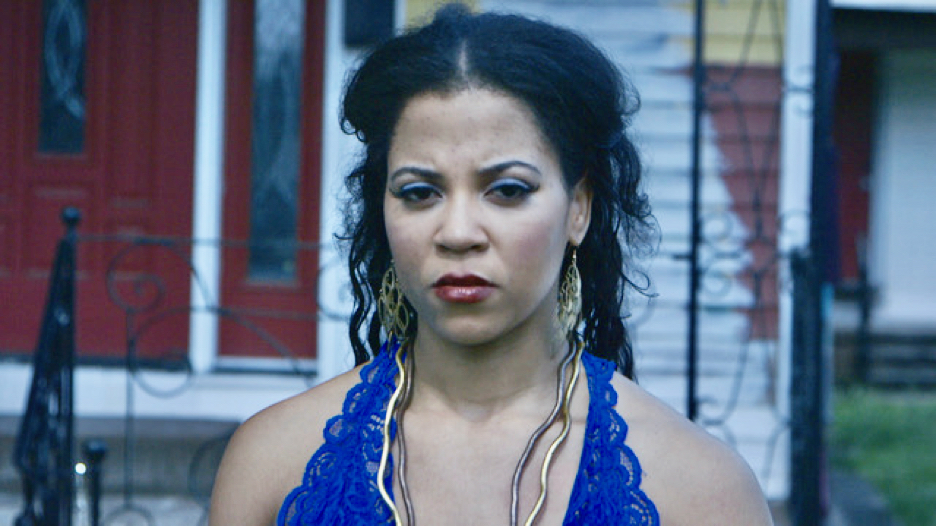
Employing very little dialogue (an echo of the original, which has none at all), Dr. Chevalier’s Lie is narrated through inter-cut images of a reality that unfolds for a doctor in the coroner’s office, who must establish the cause of death for the corpse on his gurney. When he sees the body, he recognizes it as that of a bipolar young woman, for whom his office had issued protective orders. His “lie” then becomes the failure of social institutions—like his and that of the police—to protect vulnerable Black women.
Most of the shooting for “Dr. Chevalier’s Lie” took place not far from the New Orleans Ninth Ward home of one of the producers and along the nearby levee of the Mississippi River.
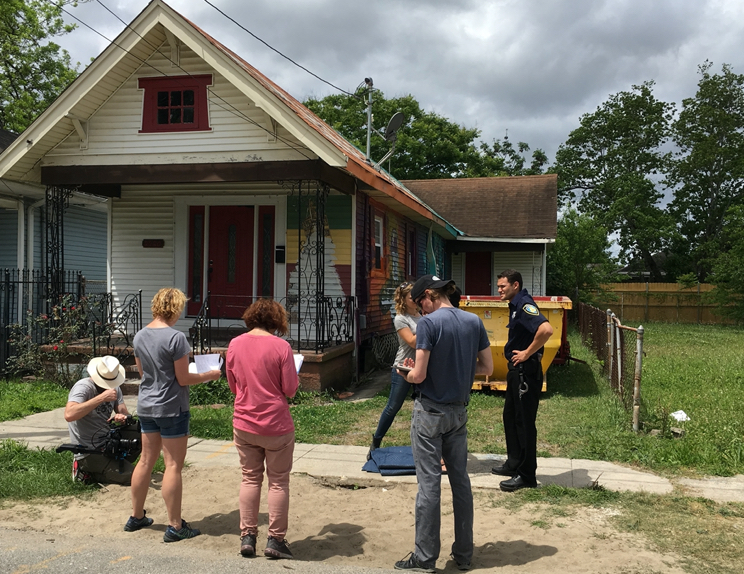
But the scenes in the coroner’s office were shot in a vast warehouse (generously loaned to us) full of movie props.

Seriously: acres of stuff, from which to create the precise details of period offices or bedrooms or hospitals, filled with the appropriate phones or chairs or folders or gurneys or basketballs or ballpoint pens or adding machines or whatever. For those of us unfamiliar with the film industry, it was a revelation! Our concern for accuracy in details also required that we research the exact medical language of an autopsy, which is included on a barely visible whiteboard in the office set.
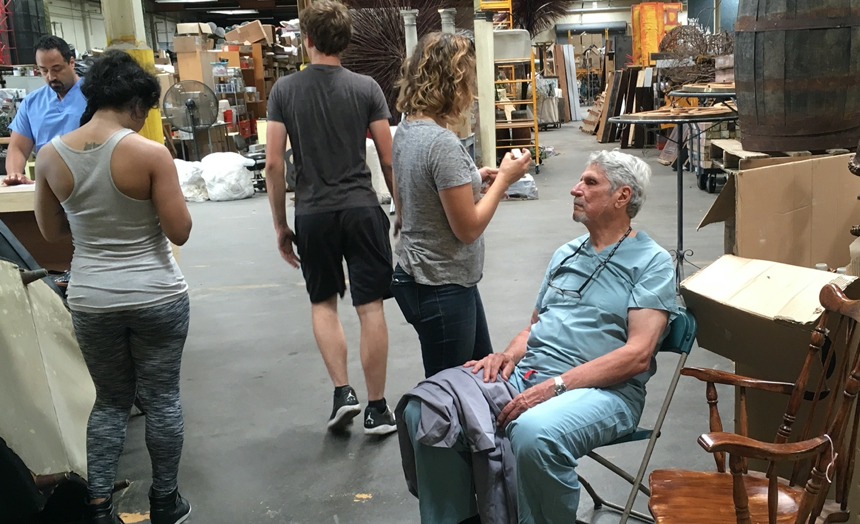
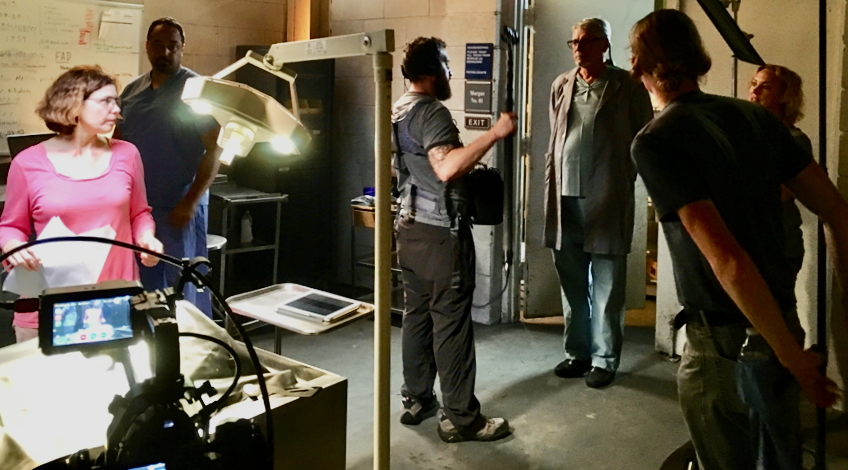
One of the few speaking parts in this film belonged to Bryan Pedeaux, the owner of the Haydel-Jones House, where Ripe Figs had been filmed a few weeks earlier. An expression of the producers’ gratitude, the role was not, as it turned out, Dr. Pedeaux’s acting debut.
Official Film Fest Selection
Vero Beach Wine and Film Festival 2018 (premiere)
MidTenn Film Festival 2018
Skyline Film Festival 2018
Film Girl Film Festival 2018
Black Film Festival New Orleans 2019
DTC Film Festival 2019
About Ripe Figs Productions
Ripe Figs Productions, LLC, was founded in 2009 by three women who shared a vision of adapting the short fiction of Kate Chopin to film. Rachel Grissom (writer, film producer and director), Dr. Artemis Preeshl (director, actor, producer and theater scholar), and Dr. Barbara Ewell (Chopin scholar and producer), were drawn to Chopin’s fiction because of its pointed examinations of gender, social status, race, and cultural identity, revealing how those factors define individual freedom and social limits. In their adaptations of Chopin’s short stories, the producers have sought to underscore the contemporary relevance of Chopin’s work, a commitment also underscored in their statement of mission.
The world was often a harsh place for women and people of color in Chopin’s time. But in writing about those issues, sometimes subtly and often against the grain of contemporary beliefs, Chopin also helped to ameliorate those attitudes, heralding many of the transformations in notions of gender and race that we take for granted a hundred years later. We still have a long way to go. We hope that our films will continue to make the changes encouraged by Chopin’s perceptive tales.
Related projects include a filmscript of Kate Chopin’s “Desiree’s Baby,” which was a finalist in the CreateLouisiana Film Grant program (2017) and “Inacheve” (2009) a short film adaptation of Kate Chopin’s “A Respectable Woman.”
About the Founders of Ripe Figs Productions
Barbara C. Ewell is Professor Emerita and the former Dorothy H. Brown Distinguished Professor of English at Loyola University New Orleans, where she taught southern literature, late 19th-century American literature and women’s studies. Her publications include a monograph on Kate Chopin (1985); numerous essays on southern women writers, feminist pedagogy, Renaissance poetry and other topics, and several coedited volumes, most recently (with Teresa Toulouse) Sweet Spots: In-Between Spaces in New Orleans (2018). Bringing her expertise on Chopin, she co-founded Ripe Figs Productions, LLC in 2009 and appears as an extra in Regret. She is this website’s general bibliographer .
Rachel Grissom is a writer and filmmaker who lives and works in New Orleans’ celebrated Ninth Ward. She has written or directed nearly a dozen short films, short stories, plays and one feature film. A graduate of Emerson College’s MFA program in creative writing, she has worked for the last decade below the line as a production sound mixer on over 60 film and television projects, most recently, the TNT series Claws. A co-founder of Ripe Figs Productions, LLC, Ms. Grissom has written its screenplays and recently directed Regret, which was funded by a Seed&Spark campaign.
Artemis Preeshl is a director, actor and choreographer in Africa, Asia, Australia, Europe, and the U.S. She directed Ripe Figs, winner of Best Short Film at the Raleigh Film & Art Festival. A Fulbrighter, Dr. Preeshl wrote and directed Pancha Ratna (Honorable Mention, DIY Hollywood), and screened Inachevé, her first film based on Kate Chopin’s short story “A Respectable Woman,” at Fatima Jinnah Women’s College in its Asian premiere, offering lectures on adaptation in Pakistan. Southern States Film Festival nominated her as best director for Dr. Chevalier’s Lie. Most recently, Artemis plays Mamzelle in Regret, which premiered at the Vero Beach Wine and Film Festival in 2020. An International Acting Fellow at Shakespeare’s Globe, she directed and acted in Commedia degli Errori at La MaMa Umbria. Routledge published her Shakespeare and Commedia dell’arte and Reframing Acting in the Digital Age. She has taught theatre at Elon, Loyola New Orleans, Utah State, and West Georgia universities as well as Introduction to Theatre, Understanding Dance, and World Drama, in Asia and Africa on Semester at Sea 2020. Since her election in 2013, Dr. Preeshl continues to serve on the Screen Actors Guild-American Federation of TV and Radio Artists.